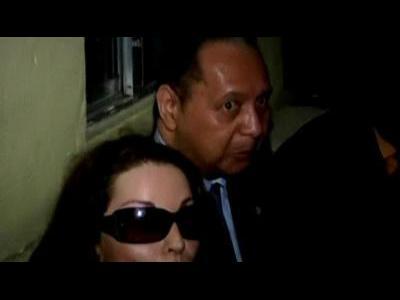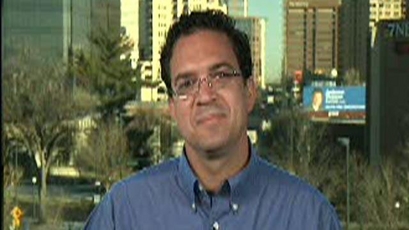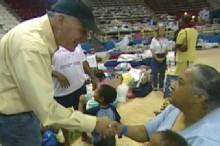PORT-AU-PRINCE (Reuters) – Rights groups on Monday demanded Haiti arrest former dictator Jean-Claude Duvalier for crimes against humanity after his surprise return from 25 years in exile, which strained an edgy political atmosphere in the volatile Caribbean state.
Analysts said the unexpected arrival in Port-au-Prince on Sunday of "Baby Doc" Duvalier, who had fled his homeland in 1986 to escape a popular revolt, could only complicate the climate of nervous uncertainty in earthquake-battered Haiti.
Tensions in the impoverished nation are running high following chaotic and inconclusive November 28 elections.
"Duvalier's return to Haiti should be for one purpose only: to face justice," Jose Miguel Vivanco, Americas director of U.S.-based Human Rights Watch, said in a statement.
Human Rights Watch and Amnesty International said Duvalier, 59, should be brought to trial for the killings and torture of thousands of opponents at the hands of the thuggish Tonton Macoutes militia during his 15 years in power.
It appeared there were no outstanding arrest warrants against him. Because Haiti's constitution bans exile for Haitians, there was nothing legally preventing Duvalier's return.
"The widespread and systematic human rights violations committed in Haiti during Duvalier's rule amount to crimes against humanity," said Javier Zuniga, special advisor at Amnesty International. "Haiti is under the obligation to prosecute him and anyone else responsible for such crimes."
The return of Duvalier was a cause of concern for Caribbean Community (CARICOM) ministers meeting in Georgetown, Guyana.
"The return of Baby Doc could be an unwelcome distraction in the current volatile situation and just when the international community is trying desperately to sustain the fragile security gains in recent years," Grenada's Minister of State for Foreign Affairs Deneth Modeste said.
Reactions in Haiti ranged from delight among old Duvalierists, anger from victims of his rule and speculation that his visit was some kind of distraction tactic in the current political crisis.
"It is sad to see people cheering 'Long live Duvalier!' ... It was a fierce dictatorship. Duvalier must pay for all those crimes," said Pierre Esperance, a local human rights activist.
INVITATION FROM "FRIENDS"
At a hotel in Port-au-Prince's Petionville district where Duvalier and his French wife, Veronique Roy, were staying, the ex-dictator received old friends and former officials. Indian U.N. police guarded the entrance to the hotel.
It was not immediately clear how long Duvalier would stay, although some reports said he planned only a short visit.
"We his friends asked him to come because we wanted to see him," Henry Robert Sterling, Duvalier's former ambassador to France, told reporters.
Hundreds of supporters were at the airport on Sunday to greet Duvalier, who flew on an Air France flight from Paris.
As a chubby playboy and the world's youngest head of state at 19, Duvalier assumed power in Haiti in 1971 on the death of his father, feared dictator Francois "Papa Doc" Duvalier. "Baby Doc" continued the Duvalier dynasty, which inspired fear and loathing among many, until going into exile in France in 1986.
Duvalier said on Sunday he had returned to show solidarity to the people of Haiti, the poorest state in the Western Hemisphere, which is grappling with a cholera epidemic and struggling to recover from a devastating 2010 earthquake. He said he wanted to participate in Haiti's "rebirth."
Analysts said his return could not come at a worse time for Haiti, which is on edge after confused legislative and presidential elections in November. Preliminary voting results have triggered fraud allegations and violent street protests.
"As if Haiti's politics weren't turbulent enough already, the presence of the former dictator is likely to arouse strong passions across the political spectrum," said Michael Shifter, president of the Washington-based Inter-American Dialogue.
OAS CHIEF VISITS
Shifter said Duvalier's reappearance could prompt another controversial former president, firebrand ex-Roman Catholic priest Jean-Bertrand Aristide, to try to return from his exile in South Africa. Aristide fled an armed rebellion in 2004.
Duvalier had faced accusations of corruption and human rights abuses when he fled the country in 1986 during massive street protests and diplomatic pressure from Washington.
A source close to Duvalier said he had returned under a diplomatic passport.
"Haiti has enough troubles without Duvalier ... Duvalier's presence -- unless he is immediately arrested -- is a slap in the face to a people which has already suffered so much," Vivanco said.
Duvalier's return adds a divisive figure to Haiti's politics, just days after it commemorated the first anniversary of the 2010 quake that killed more than 300,000 people.
The outcome of the U.N.-backed November 28 elections is up in the air after Organization of American States experts last week delivered a report to outgoing President Rene Preval challenging preliminary official results.
Preval has said he has reservations about the methodology of the OAS report he himself requested. It recommends Preval protege Jude Celestin be eliminated from a second round run-off vote in favor of popular musician Michel Martelly.
OAS Secretary-General Jose Miguel Inzulza traveled to Haiti on Monday to meet with Preval, who has been accused by opponents of rigging the elections.
The OAS report, which said there were significant vote tally irregularities, confirmed opposition matriarch Mirlande Manigat as the candidate with most first-round votes. She remains in the run-off but it is unclear when it will be held.
Haiti's Provisional Electoral Council, the elections authority, must decide whether to accept the OAS recommendation to include Martelly and drop Celestin in the run-off.
(Additional reporting by Neil Marks in Georgetown, Pascal Fletcher in Miami; Writing by Pascal Fletcher; Editing by Bill Trott)








